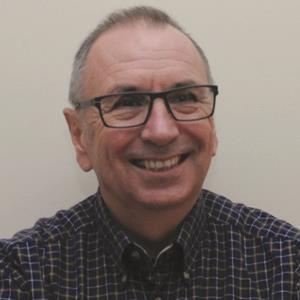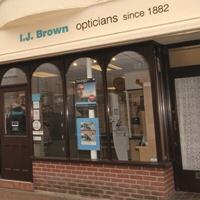‘I don’t want to take over the world,’ says David Goad, general manager of Robert Frith Optometrists, but the acquisition of IJ Brown may help him save the world of independent optics.
The acquisition (Optician 11.11.16) could be viewed as a simple business takeover boosting Frith’s tally of practices to 15 and filling in some of the gaps in the West Country group’s coverage. But for some eye care professionals, potentially readers of this article, it could mean owning their own business, a life in a new community, and a career as an independent.
Goad freely admits he has always thought the Robert Frith group should have between 15 and 20 sites to achieve the right scale and had been looking to ‘fill in the gaps’. But he also admits that being offered the opportunity of buying four practices just as Frith was settling in the acquisition of Harts of Yeovil did not make for good timing. This ‘marriage made in heaven’, has added Brown’s Swanage, Dorchester, Weymouth and Bridport practices to complement Frith’s practices in Gillingham, Shaftesbury and Blandford, Castle Cary, Wincanton, Glastonbury, Yeovil, Chard Crewkerne and Sidmouth. A Twickenham practice, owned by Robert Frith, completes the 15 across Dorset, Devon and Somerset.
Goad now has the job of finding professional partners for the four, now independent, practices acquired from Brown, who will co-own the practices following the model Frith has adopted for its West Country outlets. And Goad is keen to have these partners in at the beginning before discussions about any changes to the practices takes place. ‘I would rather have someone in there who is going to share in those discussions. If people are in on the ground floor we can build it up together.
For that search Goad is reaching out to find the next generation of eye care professionals who will take on the mantle of independent practice. The market has changed with most newly qualified professionals opting to work in the multiple sector. As well as offering an opportunity Goad also wants to reassure some of those considering a move to become ‘the master of their own destiny’.
‘What I would like people to get out of this is that independent optics is a force to be reckoned with and it’s a safe place to go and put your career. People shouldn’t be frightened of coming out of multiple optics, not that I’ve got anything against the multiples. Frith has been around for 90 years and IJ Brown has been around for 134 years. They are both viable companies, when we took IJ Brown on we didn’t take it on as a failing company we took it on because the owners wanted to retire and it’s a perfect fit for us.
‘Each of our practices is a business in its own right, it’s a limited company, and they are co-owned by one or two or even sometimes three people and the guys working in that practice have the big decision-making capabilities. We are here to guide them and advise them against doing anything unwise.’

He says being part of a group creates a good environment for becoming independent because of the back up provided. ‘It’s not a big business machine but there’s us with years and years of experience about making small business work and do all the nasty bits like the payroll, VAT – there’s none of that sort of stuff.’
He says there is also a group of experienced practitioners banded together under the two names, that resource is available to all new partners. Setting up on their own can be an incredibly isolating experience. ‘We have that in an organisation here that can help people right from the word go.’ The group also has a central lab practices have access to. ‘As a lens partner we use Hoya. We get fantastic service, they have beautiful products and if they say they are going to do something they do it.
‘Normally the way we would work is we would have someone who wanted to come and work with us and we would say “let’s have a look around and see what we could find”, and find a practice that might be worthwhile for them and the wider group. This time we were presented with the opportunity to go in with IJ Brown and they filled in patches in the area we wanted to fill in. What we would like to do now is put those practices out to co-ownership too.’
This is not a fixed model and Goad says any combination of optometrist, dispensing optician and manager can work.
As well as the prospect of getting people to switch out of the multiple sector Frith faces another hurdle, its location. ‘Getting professional staff is difficult in the South-West and I think one of the reasons for that is that people are a little bit worried about jumping out of the multiples and moving to somewhere like Dorset, Devon or Somerset,’ says Goad. He seems surprised that professionals do not want to move to some country areas. ‘I work where people go on holiday, it’s fantastic, I love it, I can’t understand why people aren’t flooding here to work. I suppose it’s that fear of the unknown especially among young people.’

Goad says he works somewhere people go on holiday
He suggests worries about evenings and social life may also factor, ‘you can only count so many sheep’. But, he says: ‘There is actually quite a vibrant social life going on these towns as well. It’s not all rural backwaters.’
The type of person suited to independent optics is someone who has the desire to run their own business and the personality to engage patients, says Goad. ‘If someone is coming in as a co-owner you are not going to be wanting to do that when you are 64,’ says Goad. He expects most interest to be among people in their 30s and 40s. What he is more interested in is personality, ‘someone who wants to control their own destiny, that’s what it’s about’.
‘We offer a situation where people can buy in. We can arrange finance and we also provide the safety cushion of buying them back out, at any time depending on what the current value is. As yet we have had no one who wants to leave us. As far as we are concerned staff turnover is through retirement or maternity leave and those generally come back even if on a lower number of days.’
The Robert Frith Group welcomes new partners from the multiples and Goad himself previously worked for regional chain, Melson Wingate. ‘If I had known what is was like I would have done it earlier myself,’ he adds.
The selection process is based around an informal interview to allow the applicant to get to know the Frith culture and the local area but also for Goad’s team to see what the candidate is like in a real life situation. ‘I’m not a fan of formal interviews, we want to know what they are like. We have a chat and make sure we are both thinking in the same direction and what they want is what we can offer. If they are happy to, we will always pay for them to do locum work. There’s nothing like working somewhere to find out what it is really like. It’s a really happy place to work, it’s like an extended family.’

‘The reason independents are successful is down to the personalities of the people who run them. Although we might have Frith over the door the people who use those facilities do so because of the people in there.’ People have to be charismatic, he adds, ‘We want to work with real people because they have the ability to attract patients. That personality has to work within Frith’s model of servicing a targeted audience with excellent service and excellent products. Within each practice you have to decide who you are going to appeal to.
‘There’s no point doing what Specsavers do, you can’t out Specsaver Specsavers, they are brilliant at what they do.’ He has great respect for Specsavers’ role in raising the profile of the profession but says discounting is not Frith’s way. ‘We have never discounted and, as long as I am here, we never will.’
Frith’s core audience is people who want good service and better products. ‘You can buy products from us at the same price as you buy from Specsavers,’ adds Goad, ‘but realistically they are not the type of products our customers want to buy. They are buying much better products with a higher value and demand good service. It’s up to us that we don’t let them down.’
While the ethos across the group is similar, the delivery for each practice can be very different depending on the town and type of patient. ‘We have a rolling programme of refits on all our practices so they never look tatty or out of date. It’s an insult to the local population to think you can get away with something that is past its sell by date simply because you are in the sticks. Don’t think Frith operates in market towns where no really one knows what day of the week it is. Nothing could be further from the truth.’
Many of the group’s populations are well off, he says, they will go to London shopping. They come to us because we offer the range of products they want with the service they want, in the environment that they want. That may mean the décor or having OCTs , which, adds Goad quickly, all the practices have. ‘The patients deserve it and the staff love them.’ If the offering is right customers won’t jump in the car and drive to a multiple in the nearest big town. It is difficult for Boots, Vision Express and Specsavers to be in tiny towns because the levels of turnover they need exceeds the availability in those towns, he says. ‘Because we don’t have the infrastructure costs we don’t have the need for that turnover.’
It is all about removing obstacles, says Goad. ‘Any optician worth his salt will have his own online shop, which we do, and that is primarily for keeping our patients with us. They know that there is a proper optician behind it all who will look after them in the event of something going wrong. We shouldn’t be selling unlicensed products – that would be madness, but others are. We must make the customer’s path to our products as easy as possible. Opticians historically have been really bad at that, because we hide behind our cloak of professionalism and we don’t look at what the patients want and need.’
The Frith approach mirrors a growing trend around the country for clusters of independents to coalesce and benefit from economies of scale. Goad likens this to an umbrella, protecting those practices working under it. This all comes at a time when there are many in the profession thinking of retirement. ‘There are people who have been in independent practice for a few years who are beginning to think it’s time to think about retiring and those people are wanting to sell up,’ says Goad. ‘Some independents, visionaries, understand that when you start bringing practices together you can benefit from the sum of group.’ But, he adds, they also understand the importance of maintaining that independence because that is why the patients go to that practice.
So is this a model for the future of independent practice? ‘There is this umbrella that keeps the rain off you,’ says Goad. Different organisations around the country have come to a similar conclusion and he does not see why independent practices cannot work together like this in future. ‘We have to be light on our feet. If someone comes up with a great idea in one of our practices we do it everywhere,’ he says. If something happened in the market which meant all opticians had to radically change the way they worked Robert Frith Group could do that. He is not so sure a huge group could change that quickly.
Independents need that autonomy to remain flexible but that is not to say support mechanisms, such as Independent’s Day, are not useful. ‘One of the organisations that has become more relevant is the Association of Independent Optometrists,’ says Goad. ‘I would encourage all independents to become members. It’s a great way of getting the benefit of the wider experience of the sector. They are doing it better and better and they fight the right causes.
‘I genuinely think we are a crossroad. A lot of people are coming up to retirement and the model that they joined when they started out has gone.’
He says opportunities for young, enthusiastic optometrists and DOs to get out and work in the independent sector are all there. This will help revitalise the independent sector and make it a force to be reckoned with. It’s also a great place to practise. ‘You are talking to people who are more open to what you are advising them, It’s not as stressful and cut and thrust as in the multiple.’ If you really want to go for it: ‘The sky is the limit in terms of earnings.’
‘We don’t want to take over the world,’ concludes Goad. ‘That would destroy the very thing we have been trying to build up, all the principles we stand for so we don’t want to do that. However, if the right practice comes up in the right area then we would look at it.’
For now the hunt is on for professionals who want to become partners and masters of their own destiny delivering eye care to a community while making a decent living. ‘We are offering a new lifestyle and the ability to earn whatever you want to earn in an environment which is of your creating.’ But that is not all. He wants to see a future for young dedicated professionals working in a strong, independent optical sector.
‘We all work for the money but it’s the love of the sector and the business that moves me forward. There’s a lot of people out there who wouldn’t have the care they need if the independent sector wasn’t there.’
